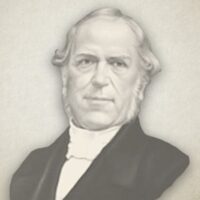
16 The Universal Invitations Of The Duty Faith System
One radical and very fruitful evil in the spirit of duty faith is, that it turns all the particular invitations of the gospel into general ones, saying, ‘they belong to all alike, and not to any particular characters,’ as are named in the invitations. The invitations of the gospel are a very rich and precious part of the word of God, and in them are contained four jewel ingredients of precious truth for special purposes, and which are, first, the nature of a promise; second, the welcome character described; third, the adapted blessing named; and fourth, the welcome expressed, come, &c. And the invitations of the gospel are in every point and property as sure and infallibly amen in Christ Jesus, as the more simple promises are; for the truth of the Lord, of which the invitations are a most gracious part, ‘endureth for ever.’ Divine truth never did fail, nor in part of it can it fail, in the use and end that God himself intends thereby; and if any part fail in the way that man takes it up and applies it, that is a clear and undeniable proof at once, of its being taken up wrong, and in a way and for an end the Holy Spirit of truth never intended. And nothing is more self-evident than that universal invitations have failed, do fall, and must fail; many of the invited being in a state in which it is impossible for them to come, and are without any warrant from the Lord that they ever will be in a possible state to come, and if the invited to the eternal salvation of God never come, does not the invitation fall? Because it cannot be said in this case as in a mere natural one, ‘That I sent for them to come if they please, or stay away if they please;’ for the Lord knows that without his quickening and regenerating power and grace, no soul under the heavens can possibly come into the personal state, character, and blessings of Christianity and endless life. Nor are the invitations vindictive, as seeking a further, occasion of condemnation against them who are already under the death sentence of the law, and cannot possibly of themselves stir from thence; but they are gracious only, benefiting many and injuring none. The invited of God have always come, do come, and will come; and so the invitations have always stood good and effectual to the end of God’s purpose and grace in them. For as no part of God’s truth is or can be without an effectual end and design, the evident design of the gospel invitations is, the conducting of those very characters described in the invitations, to the blessings, and hope of the blessings named in them, as most happily adapted to their described condition.
Gospel doctrines, as so many truths of standing matters of fact, are to be preached to all men of all nations, for the special purpose In the hand of the Holy Ghost, of convincing men of sin, of righteousness, and of judgment, John 16: 8-11, according to the Saviour’s redemption of sinners out of all nations of the whole world; and the invitations are for the gracious welcome and gathering together into the comforts and blessings of Christ unto salvation, all those who are convinced and reduced in soul state, experimentally to the character described in the invitations; and this is the effectual order of every part of the infallible word of God. But duty faith men do not consider that sinners are preached to, unless universal invitations are held out to them, and which is altogether like saying that the whole of God’s infallible truth is not preached, unless something fallible, useless, and irreconcilably opposed to it, be served up with it! I have myself been asked, ‘Do you preach to sinners, sir?’ meaning, do you invite all? And to which my answer has been, ‘Yes, I preach to all sorts of sinners, and never had the honour to preach to any one else;’ while I do not consider, that inviting the dead in sins to the living feast of saints, to be preaching the truth at all. But on universal invitations we may further observe:-
John Foreman (1792-1872) was a Strict and Particular Baptist preacher. He was appointed the Pastor of Hill Street Chapel, Marylebone, serving this position for close to forty years.
JOHN FOREMAN'S LIFE AND MINISTRY
JOHN FOREMAN ON DUTY FAITH (COMPLETE)
JOHN FOREMAN'S BAPTISM AND COMMUNION CONSIDERED (COMPLETE)




